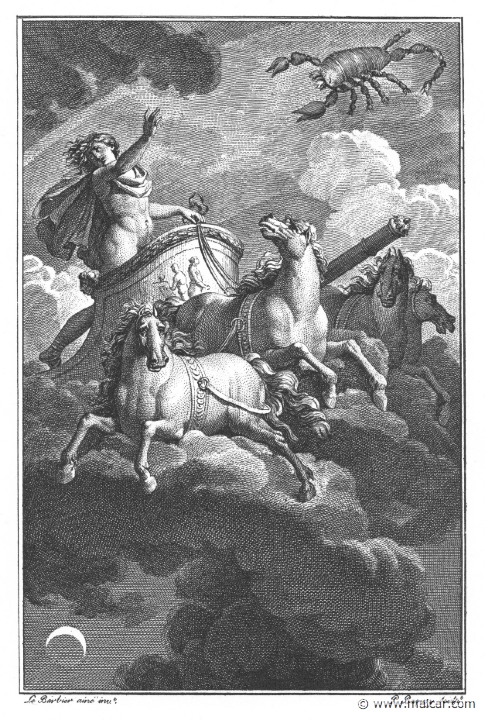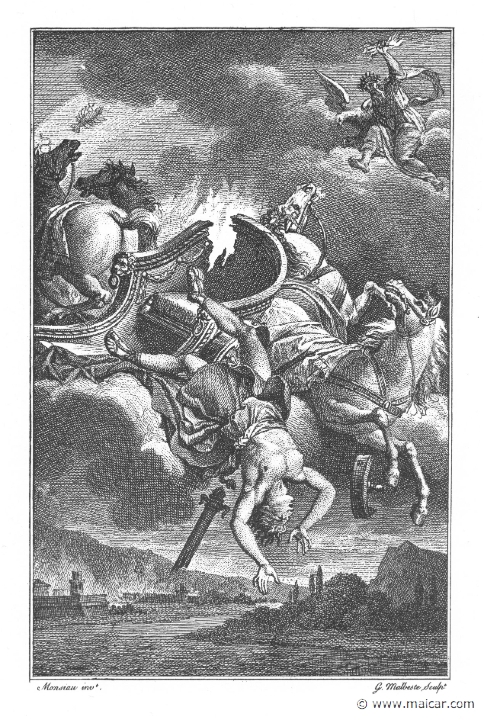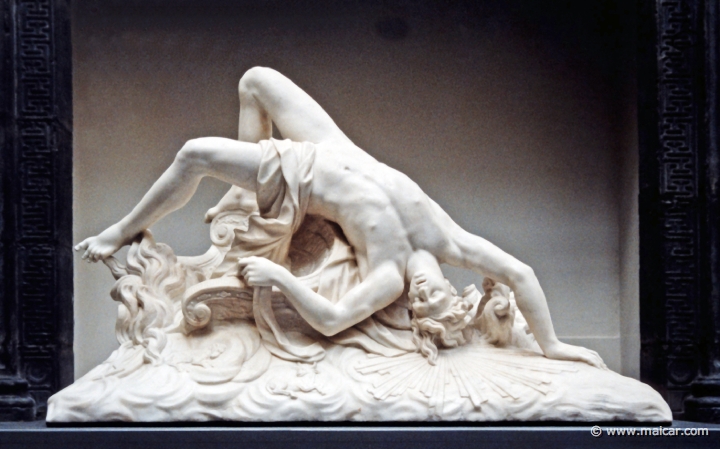|
Phaethon 3 asked for his father's chariot and the right to drive it for a day. He traversed the heavens and flew over the earth, but being an incompetent driver, he set them afire.
Parentage of Phaethon 3
|

|
01049: Phaethon. "The driver is panic-stricken. He knows not how to handle the reins entrusted to him, nor where the road is; nor if he did know, would he be able to control the steeds." (Ov. Met. 2.169). Guillaume T. de Villenave, Les Métamorphoses d'Ovide (Paris, Didot 1806–07). Engravings after originals by Jean-Jacques François Le Barbier (1739–1826), Nicolas André Monsiau (1754–1837), and Jean-Michel Moreau (1741–1814).
|
|
Some say that Phaethon 3 is the son of Helius (Sun) and the Oceanid Clymene 1; but others affirm that his parents were Clymenus 5 and the Oceanid Merope 4, and that Clymenus 5 was the grandfather of Phaethon 3, being himself the son of Helius. It is told that Phaethon 3 and Epaphus 1—son of Io and future king of Egypt—were companions and had the same age, and that it was a discussion between them that made Phaethon 3 investigate the question of his father. For Epaphus 1 denied that Phaethon 3's father was Helius, and Phaethon 3 had no evidence of it, since his mother Clymene 1 was at the time living with King Merops 2 of Ethiopia, who had adopted him. Eager to justify his claims to divine origin, Phaethon 3 asked of his mother Clymene 1 some sure token of his birth. This kind of eagerness is not at all uncommon; for there are not few who suppose that birth and inheritance will automatically provide the qualities they feel they lack, or at least enhance those they feel they own.
Clymene 1 tells the truth
Clymene 1, who in turn could fear that the memory of her love affair with great Helius would be lost, was easily moved by her son's request. So swearing by the sun itself, she reassured his son of his divine origin, and added that if he still was in doubt he could indeed visit his father's palace—which was not far away—and receive an answer from Helius himself. So Phaethon 3 went accross his land, and soon saw himself in front of the doors of the golden palace of Helius.
Phaethon 3 meets his father
Having come inside the palace, Phaethon 3 saw his father sitting on his throne, surrounded by members of his court: Day, Month, Year, Century, the Hours, and the Seasons. When Helius asked him for the reason of his presence, Phaethon 3 requested a proof by which all might know that he was his true son, and that Clymene 1 has not been talking in vain. Helius then embraced
him and said:
"You are
worthy to be called my son, and Clymene has told
you the truth. And that you may not doubt my word,
ask what boon you will." (Helius to Phaethon 3. Ovid, Metamorphoses 2.42).
and he made the oath of the Styx (for this oath see Underworld).
|

|
01057: The Fall of Phaethon. "He thundered, and, balancing in his right hand a bolt, flung it from beside the ear at the charioteer and hurled him from the car..." (Ov. Met. 2.310). Guillaume T. de Villenave, Les Métamorphoses d'Ovide (Paris, Didot 1806–07). Engravings after originals by Jean-Jacques François Le Barbier (1739–1826), Nicolas André Monsiau (1754–1837), and Jean-Michel Moreau (1741–1814).
|
|
Phaethon 3 asks for the chariot
When Phaethon 3 heard the oath, he immediately asked for his father's chariot and the right to drive his horses for one day. Helius tried to dissuade
him, for that was too great a boon, and something
to be performed by an immortal and not by a mortal.
And even if the other immortals may do as they
will, none, not even Zeus,
according to what Helius explained to his son, could drive his chariot of
fire; for the first part of the road is steep and
difficult, the mid-way is extremely high, and the
last part, being precipitous, requires an assured
control. Moreover, all parts had to be performed
while the vault of heaven spins round in constant
motion, whirling at high speed. Through detailed descriptions of the dangers of
this daily trip, Helius attempted to induce his son to make a wiser decision, begging him not to ask this one thing, which would prove to be a bane and not a blessing. But ambitious Phaethon 3 could not lend his ears to his father's words, and he was finally granted to drive the chariot (although there are those who affirm that Phaethon 3 mounted the car secretly). When Eos had opened the way, making all stars flee away, Phaethon 3 mounted the chariot of fire, once wrought by Hephaestus, and the HORAE yoked the steeds.
Not having been able to dissuade his son, Helius gave him driving
advices: to spare the lash and use the reins, not
to take the way straight through the five zones of
heaven, but to follow the path which runs
slantwise, with a wide curve and within the limits
of three zones, avoiding the far south and the far
north. Helius also
advised him neither to go too low nor too high, so
to avoid burning either the earth or the sky. And
still at the last minute Helius bade him:
"Take my
counsel, not my chariot, while you still stand on
solid ground." (Helius to Phaethon 3. Ovid, Metamorphoses 2.145).
But Phaethon 3 could not listen, and he lifted.
Phaethon 3 loses control
Very soon the horses noticed the absence of a
firm hand; and when the chariot left the accustomed
track, what was supposed to be heated grew cold,
and what should be cold grew hot. And when the
driver looked down, he was panic-stricken, and
likewise when he looked in other directions. For
one thing is to look at the constellations from the
ground, and another to travel through or near them.
And the horses, not being able to recognize the
track, broke loose even more from their course,
roaming aimlessly through unknown regions, at times
climbing up to the top of the sky, at other times
plunging headlong down near the earth.
The world on fire
In heaven there was amazement, but on earth the meadows were burned, the trees consumed, and whole cities and nations were reduced to ashes. In the meanwhile, the driver breathed air hot like fire and was completely blinded by the dense smoke, not being any more able to tell where he was or whither the horses were taking him. It was at this time that the Ethiopians and the
Indians became black-skinned, and Libya became a
desert, and many regions lost their fountains and
their pools. In the same way, the seventh mouths of
the Nile were filled with dust, and many rivers
steamed when their banks were aflame. Some have
said that it was then the Milky Way was created. So Gaia addressed Zeus and warned of the
impending danger:
"If the sea
perish and the land and the realms of the sky, then
we are hurled back to primeval Chaos." (Gaia to Zeus. Ovid, Metamorphoses 2.299).
Zeus ends the trouble
with a thunderbolt
When Zeus saw that there were no clouds to spread over the earth nor rains to send, he flung a thunderbolt at the incompetent charioteer, and thus put and end to the sorrows of both earth and sky, and to his life as well. It has also been said that when Zeus struck him, everything
on earth started to burn, and the god, who hoped
for a chance to destroy all mortals, pretending
that he wanted to put out the fire, sent the Flood that drowned almost
everyone, except Deucalion 1 and his wife. Phaethon 3 himself is said to have fallen in the river Eridanus, where the Naiads carved his epitaph:
|

|
7827: Dominique Lefevre 1698-1711 (active): The fall of Phaethon. Marble. Victoria and Albert Museum, London.
|
|
"Here lies
Phaethon: In Helius' car he fared
And though he greatly failed, more greatly dared." (Ovid, Metamorphoses 2.325).
It have been said that, because of what
happened, one whole day went without the sun, but
still light was not lacking since the world was
burning.
Lamented death
The death of Phaethon 3 was much lamented: His mother Clymene 1 wandered over the whole earth looking for his limbs and bones, and the HELIADES 1, daughters of Clymene 1 and sisters of the unfortunate driver, wept so much for their brother that their tears hardened into amber, turning themselves into poplar trees near the river Eridanus, which some believe is the Po. Also King Cycnus 6 of Liguria, son of Sthenelus 6, being a friend of Phaethon 3, grieved him much; for he abandoned his kingdom, and went weeping along the Eridanus until he was turning into a swan.
Others with the same name
Phaethon 1, son either of Tithonus 2, or of Cephalus 2, was ravished by Aphrodite, and made a keeper of her shrine. Phaethon 2 is one of Eos'
steeds.
|